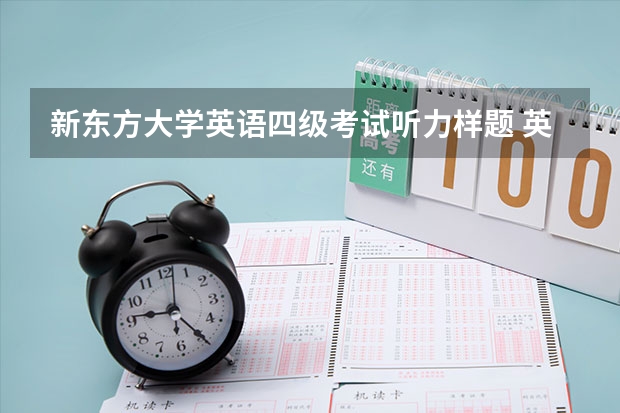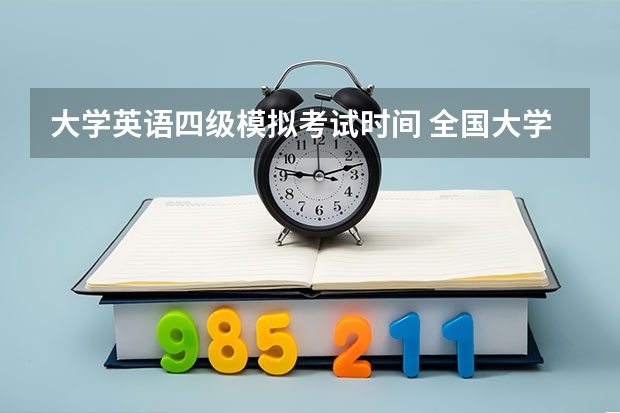新东方大学英语四级考试听力样题 英语四级听力长对话怎么做
2023-09-28 09:37:25 | 金大话英语培训网

英语四级听力长对话怎么做
四级听力将会在2016年再次调整, 短对话取消, 增加短新闻听力,所以现在讨论这个问题已经没有意义了,下面是改革后的官方样题,你参考一下。大学英语四级考试听力样题
Part II Listening Comprehension (25 minutes)
Section A
Directions: In this section, you will hear three news reports. At the end of each news report, you will hear two or three questions. Both the news report and the questions will be spoken only once. After you hear a question, you must choose the best answer from the four choices marked A), B), C) and D). Then mark the corresponding letter on Answer Sheet 1 with a single line through the centre.
Questions 1 and 2 will be based on the following news item.
1. A) Christmas-time attacks made by Somali rebels.
B) An explosion at a bus station in central Nairobi.
C) The killing of more than 70 Ugandans in Kampala.
D) Blasts set off by a Somali group in Uganda’s capital.
2. A) On Christmas Eve. C) During a security check.
B) Just before midnight. D) In the small hours of the morning.
Questions 3 and 4 will be based on the following news item.
3. A) It is likely to close many of its stores.
B) It is known for the quality of its goods.
C) It remains competitive in the recession.
D) It will expand its online retail business.
4. A) Expand its business beyond groceries.
B) Fire 25,000 of its current employees.
C) Cut its DVD publishing business.
D) Sell the business for one pound.
Questions 5 to 7 will be based on the following news item.
5. A) All taxis began to use meters.
B) All taxis got air conditioning.
C) Advertisements were allowed on taxis.
D) Old taxis were replaced with new cabs.
6. A) A low interest loan scheme. C) Taxi passengers’ complaints.
B) Environmentalists’ protests. D) Permission for car advertising.
7. A) There are no more irregular practices.
B) All new cabs provide air-conditioning.
C) New cabs are all equipped with meters.
D) New legislation protects consumer rights.
Section B
Directions: In this section, you will hear two long conversations. At the end of each conversation, you will hear four questions. Both the conversation and the questions will be spoken only once. After you hear a question, you must choose the best answer from the four choices marked A), B), C) and D). Then mark the corresponding letter on Answer Sheet 1 with a single line through the centre.
Conversation One
Questions 8 to 11 are based on the conversation you have just heard.
8. A) It has a partnership with LCP. C) It specializes in safety from leaks.
B) It is headquartered in London. D) It has a chemical processing plant.
9. A) He is a chemist. C) He is a safety inspector.
B) He is a salesman. D) He is Mr. Grand’s friend.
10. A) The public relations officer. C) Director of the safety department.
B) Mr. Grand’s personal assistant. D) Head of the personnel department.
11. A) Wait for Mr. Grand to call back.
B) Leave a message for Mr. Grand.
C) Provide details of their products and services.
D) Send a comprehensive description of their work.
Conversation Two
Questions 12 to 15 are based on the conversation you have just heard.
12. A) Teacher. C) Editor.
B) Journalist. D) Typist.
13. A) Some newly discovered scenic spot.
B) Big changes in the Amazon valley.
C) A new railway under construction.
D) The beautiful Amazon rainforests.
14. A) In news weeklies. C) In newspapers’ Sunday editions.
B) In a local evening paper. D) In overseas editions of U.S. magazines.
15. A) To become a professional writer. C) To get her life story published soon.
B) To be employed by a newspaper. D) To sell her articles to a news service.
Section C
Directions: In this section, you will hear three passages. At the end of each passage, you will hear some questions. Both the passage and the questions will be spoken only once. After you hear a question, you must choose the best answer from the four choices marked A), B), C) and D). Then mark the corresponding letter on Answer Sheet 1 with a single line through the centre.
Passage One
Questions 16 to 18 are based on the passage you have just heard.
16. A) She is both a popular and a highly respected author.
B) She is the first writer to focus on the fate of slaves.
C) She is the most loved African novelist of all times.
D) She is the most influential author since the 1930’s.
17. A) The Book Critics Circle Award. C) The Pulitzer Prize for fiction.
B) The Nobel Prize for literature. D) The National Book Award.
18. A) She is a relative of Morrison’s. C) She is a skilled storyteller.
B) She is a slave from Africa. D) She is a black woman.
Passage Two
Questions 19 to 21 are based on the passage you have just heard.
19. A) They are very generous in giving gifts.
B) They refuse gifts when doing business.
C) They regard gifts as a token of friendship.
D) They give gifts only on special occasions.
20. A) They enjoy giving gifts to other people.
B) They spend a lot of time choosing gifts.
C) They have to follow many specific rules.
D) They pay attention to the quality of gifts.
21. A) Gift-giving plays an important role in human relationships.
B) We must be aware of cultural differences in giving gifts.
C) We must learn how to give gifts before going abroad.
D) Reading extensively can make one a better gift-giver.
Passage Three
Questions 22 to 25 are based on the passage you have just heard.
22. A) She tenderly looked after her sick mother.
B) She developed a strong interest in finance.
C) She learned to write for financial newspapers.
D) She invested in stocks and shares on Wall Street.
23. A) She inherited a big fortune from her father.
B) She sold her restaurant with a substantial profit.
C) She got 7.5 million dollars from her ex-husband.
D) She made a wise investment in real estate.
24. A) She was dishonest in business dealings.
B) She frequently ill-treated her employees.
C) She abused animals including her pet dog.
D) She was extremely mean with her money.
25. A) She carried on her family’s tradition.
B) She made huge donations to charities.
C) She built a hospital with her mother’s money.
D) She made a big fortune from wise investments.
今年12月的英语四级考试CET4 是新题型吗?与往年有什么不同?
是的.下面是一些具体的改革.近日,由全国大学英语四、六级考试改革项目组和全国大学英语四、六级考试委员会编写的《大学英语四级考试(CET-4)试点考试样卷》出版,备受考生关注的改革后四级考试新题型和样卷正式与广大考生见面。北京新东方学校国内部主任周雷介绍,新样题在听力、阅读、综合题三部分有变化,难度有所加大,写作部分未变。
听力:题型分四种长对话增多
听力的分值由原来的20%上升到现在的35%,题型也丰富为小对话、长对话、短文章、复合式听写4种。听力考查将分为3个部分:第一部分由8个小对话和2个长对话组成;第二部分是3篇小文章;第三部分为复合式听写。主要的变化来自第一个部分,小对话由原来的10个减少到8个,增加了2个长对话,每个长对话之后会有3到4道题。
阅读:减仔细阅读增快速阅读
阅读的比重由原来的40%减为35%。其中,仔细阅读的文章减少至2篇,分数占全卷的20%,题型为考生熟悉的多项选择。另出现两种新的阅读考查方法:快速阅读和选词填空。快速阅读要求在15分钟内完成一篇1200字左右的文章和后面的10道题,前7个是判断正误,后3个是填空题,答案基本都是原文中出现的原词。选词填空是在一篇220字左右的文章中,留出10个单词的空格,从给出的15个备选单词中选出10个填入文章相应处。
综合题取消结构与词汇部分
综合测试题包括完型填空或改错,篇章问答或句子翻译,分数占全卷的15%。这是新四级中较有新意的一部分,特点是题型选择多样,并有一定比例的主观题。新四级还取消了老四级中考查语法词汇的“结构与词汇”部分,取而代之以更加灵活的方式。这就要求考生不仅要能了解单词和基本句法,更应具备灵活应用所学知识的能力。
听力——
【新题型变化】:听力理解部分所占比例将由原来的20%提高到35%,其中,听力对话占15%,听力短文占20%;
【新旧题型对比】:
旧题型:对话(10分),短文听力或者听写(10分)。
新题型:对话15分(长对话、短对话),短文听力,20分,分为多项选择和听写。
无论新旧题型,考生应重点抓住听力,新题型尤其是,增加至35分,难度增大。听力考查的是考生语音、语调、单词,对文化背景的了解。因此,首先要了解四六级考试听力出题的形式,还要花大量时间去练习。
阅读——
【新题型变化】:阅读理解部分比例调整为35%,比重降低。此外,在新卷子中,旧题型试卷中专门词汇题的被取消,放到了阅读理解中。
【新旧题型对比】:
旧题型:四篇文章,每篇文章5个选择题,10分,阅读理解部分共计40分。
新题型:将阅读部分重新划分,为3个题型。一、保留了原来的多向选择题。二、增加了两个新题型,选词填空和正误判断。多选题加选词填空题共25分,判断题10分。
综合测试——
【新题型变化】:新题型第三部分叫综合测试,占15%。除新增改错题外和原来的题型没有太大差别。
【新旧题型对比】:
翻译题保留,成为必考题。而且由原来的“英译汉”,变成了现在的“汉译英”,占5分。旧题型:试卷综合测试部分每年只考一种题,完形填空、简短回答问题、翻译这3个可供选择的题型,每次只选一个。
新题型试卷新增了改错题(改错题要求辨别错误然后改正。这个题型原来的六级中有,四级中未出现过)。届时,将在完形填空、改错题、简短回答问题三个题型中,三选一,占10分。
写作——
这部分分值没有变化。四级考试要求,30分钟完成120个词左右。通常考议论文、说明文、应用文。
从2000年起作文命题指导思想开始变化,开始考更能体现考生实力的记叙与描写文以及书信演讲类应用文。2000年1月开始考“HowtoFinanceMyCol-
legeEducation?”这是一篇基本没有模式的说明文。2001年以后的10次四级作文没有出现过一次议论文,除了2002年6月、2003年1月以及2001年1月有三次说明文外,5次为应用文2次为记叙描写文。最后这两类文章基本没有写作模式,要求也不高,只要能够把观点交代清楚,把时间的前因后果记述清楚就可以了,是考查考生英语表达基本功的最佳方式,因此近年来成为出现频率最高的题型。
新题型中的作文考试会与前几年一样,继续强调能力测试。考说明文、应用文可能性比较大。

新大学英语四级考试 听力部分应对方案
教育部以及国家四六级出题委员会明确表示,从2006年6月的四级考试开始,将在180所试点院校进行新四级考试的试点,之后将逐步全面推广新四级考试。在改革后的四级考试中,除了写作部分变化不大之外,其他部分的变化非常明显,其中听力部分的比例由过去的20%跃升为现在的35%,题目的类型、数量、时间全部增加。听力部分对考生的要求无疑发生了变化。现在,笔者将为大家支招,浅析听力部分的应对方案。一、 短对话部分:(11-18题,共八题)
短对话一直是学生们比较稳定的得分点。在最新公布的新四级中,短对话的题目数量由过去的10道减少到8道。但是短对话作为最基本的类型话听力题目的事实没有改变。在11-18题中,单从选项就能够看出,11/12/18属于动作行为题;14是传统的人物关系题,而16则是更加传统的对话地点题。大部分题目都可以按照过去题目的套路解决。例如动作题目注意情态动词后的谓语,人物关系题注意职业特征词汇,地点题目抓住核心地点词汇,等等。
所以,短对话部分依然是各位考生拿分的保险项目。
二、 长对话部分:(19-25题,共七题)
长对话是四级题目中最新的面孔,之前从未出现过。前四题是一个稍长的长对话,后三题基于一个稍短的长对话。根据最新样题的例证,长一些的长对话设计为17句,即八个短对话的长度,短一些的长对话为12句,既六个短对话的长度。其实,可以把它认为是短对话和听力短文的结合。因为长对话在四级的表现就是听力短文式的问题设置用短对话的形式进行表现。听长对话的时候,首先,位置感很重要。一般而言,对话时,开头的客套以及问候与结尾的道别结束语很少出题,而对话中段往往才是重点。第二、边听边看,尽量在听的时候确定哪个选项能够最大程度的吻合,这是做短文听力的宗旨,同样适用于长对话。第三、长对话的源头应该是托福听力,所以,我们可以大胆预测诸如校园、找工作、租房、图书馆等等高频场景将再度和考生见面。
三、听力短文部分:(26-35题,共十道)
听力短文是传统题目,样题中问题的套路和过去一致。从此次的设计来看,三篇均为说明文体。(最后一篇为2003年6月听力短文第三篇文章)历史上所有文体无外乎两种:故事和说明文。说明文包含了简单说明文、科技说明文和人物传记。
考生普遍对短文类题目有畏难情绪,实际完全不必,作为一种长久出现的问题形式,它已经和小对话一样有了很明显的通用解题技巧。第一、迅速从选项辨别文体,若为故事,结尾和对话需要非常小心,若为说明文,首尾必然有题要出;第二、在整个过程中保持绝对的注意力,多数题目中的准确答案实际就是和听力原文能够最大限度吻合的选择项。千万不要因为有不懂单词和不懂的句子出现就放弃,其实那些都是假象;第三、注意短文的长考点,诸如首末句,转折关系,逻辑关系,最高级等等,这些都被证实几乎是屡考不爽的考点了。
四、复合式听写:(36-45题,共十道)
复合式听写历来是考生们最头疼的四级“绝杀”。因为完全没有选择,需要真刀真枪的写出所有答案,在过去的年份中,考生们也是能躲就躲。但是,在新四级当中,由于作为固定模式出现,复合式听写将永恒存在。十题中,前七空需要写出七个单词,实际上,这些单词中大部分都属于能够听懂,但是容易写错的单词。所以,平时的功夫就很重要了。在此建议考生,对于那些经常出现,但是总让自己的拼写出现困难的单词,考生们一定要多加注意。而对于分数设计较高的最后三个空,也就是长句子听写,笔者建议考生一定按照考试说明的要求,用“按照自己的话把题目要点写出来”而尽量不要“完全按照听到的写下来”,因为后者的难度实在太大,另外,也没有必要。在应用前者方法的同时,考生需要注意,在第一遍记录完大致的主语以及谓语后,第二遍时,请一定注意听完,在脑海里稍微用自己的思路组织一下,再动笔进行书写。因为只有这样,才能够按照“由长到短,由难到易”的方向进行长句的转化。
另外,除以上针对题目的注意事项之外,考生们还需要注意:
一、 听力单词和短语需要总结
听力考试中出现的许多单词和短语经常都会在之前或者之后的考试中再度出现,这几乎成为确定的事实。所以,对这些“熟脸”进行总结相当重要。
二、 注意力的保持
听力的时间由过去的20分钟上升到35分钟,这就对考生的注意力保持的时间提出新的挑战。其实,多数情况之下,并非题目难度导致考生失误,相反,注意力涣散才是导致失分的最大问题。
三、 难度
2005年样题的设计难度很大,尤其是复合式听写,其中竟然出现了“kyoto protocol”(京都议定书)这样的词汇,这绝对是超过绝大部分考生能力的题目。由于听力的题目数量激增、时间延长,同时,也因为改革刚刚开始,笔者有理由相信,2006到2007年的新样题中听力的难度应该不高,考生应该完全对自己充满信心。 以上,就是金大话英语培训网小编给大家带来的新东方大学英语四级考试听力样题 英语四级听力长对话怎么做全部内容,希望对大家有所帮助!

英语四级听力,长对话,是不是只有答案,没有问题大学生英语四级考试的听力考试试卷上只会出现选项,而不会出现问题,听力题目需要通过录音来获取。四级听力共有25道题目,其中主要包括短篇新闻、长对话和短听力篇章。其中短篇文章共7小题,每小题7.1分;长对话总共8小题,每小题7.1分;听力篇章共10小题,每小题14,2分。类型3.考四级过程中需要注意的点是先写作文,30分钟

四级英语考试听力技巧有哪些?四级英语听力怎么练?【导读】大学生英语四级是很多大学硬性要求的,因此这让大家很是苦恼,其实大学英语四级听力并不可怕,只需把握了正确的技巧方法,平常坚持用心去听,必定能够从不同视点、不同层次前进自己的英语听力能力。那么四级英语考试听力技巧有哪些?四级英语听力怎么练呢?下面随小编一起来了解下吧!四级英语听力技巧方法1、第一遍听磁带时细心做题,对所选取的每

考英语四六级需要看什么书以前我考四级的时候,词汇是吃的高中的老底,现在四级越来越难了,可以提前看看,推荐使用《星火四级词汇》《新东方四级词汇乱序版》其实,词汇书大同小异,买大出版社的比较靠谱。推荐买乱序版本的,因为如果是正序的从字母A开始,不太同意坚持下来。词汇书就没事多放容易拿到的地方,有碎片的时间就翻翻看。重复+多次(不太容易看一遍就记住,别着急,谁都不可能看了一遍就记住,慢

英语四级听力分值分布英语四级听力分值分布情况如下:英语四级听力总分累计是248.5分,其中包括三个部分,分别是短篇新闻、长对话、听力篇章。其中短篇新闻有7个小题目,每个题目是7.1分,也就是说这个部分分值是7.1*7=49.7分;长对话是8个小题目,每个题目也是7.1分,分值是7.1*8=56.8分;听力篇章部分包含了10个小题,每个题目是14.2分,分值是14.2*10=

英语四级听力是怎样随机抽的啊?四级有三套题,随机发放,考场上听力是一样的,就是选项顺序不一样,其他题目几乎不同,但是难度相近。其实题主的这些问题都能通过研究真题找到答案,如果要备考四级的话,一定要早入手真题,对考试题型,各版块分值,时间分布等有个大概的了解,然后根据这些制定合适的备考计划。对于那些还没有完全掌握四级状况的小伙伴,千万记的要及早抓真题,最好选择比较基础的真题。

2022英语四六级考试重要性及备考小技巧2022年的英语四六级考试目前已经结束了上半年的考试,下半年的考试目前已经开始了考试报名,很多考生对于这场考试的重要性并不理解,接下来我就为大家带来2022英语四六级考试重要性及备考小技巧,快来看看吧!英语四六级考试的重要性1:证明大学期间的学习能力大学期间学生对于学习的上进心完全由自己掌握,没有人会强制对学习要求。大学英语四六

大学英语四六级听力技巧大学英语四六级听力技巧在改革后的英语四级六级考试中,听力和阅读部分依然占据着整张试卷的绝大多数分值,在此给大家总结出提升听力成绩的几大要素,希望能对大家的复习有所帮助。提升听力成绩的三大要素:要素一、精听坚持每天花半小时精听,不要间断。建议至少听三轮:第一轮:将没有听清楚和明白的地方标注出来。第二轮:第一轮中标注的地方仔细听,直到听懂,

大学英语四级考试听力资料?我们大学时候,听的四级英语听力不在少数,但是否会提升就要看个人努力了。下面是我给大家整理的大学英语四级考试听力,供大家参阅!大学英语四级考试听力素材听力真题:SectionCpoundDictationputersareincreasinglyimportantinhealthcare.Butcantheyalsohelppoorpeopl
- 2023年6级考试时间下半年 四级报名截止时间2023下半年 北京四六级报名时间2023下半年
- 求六级百度网盘资源😭😭 求大学英语四级历年真题下载地址,有没有好的推荐 我需要 四六级历年真题,百度网盘的链接有没有呀~求哥哥姐姐们分享
- 英语四六级大学几年级考 大学几年级可以考英语四级 四六级大几可以考
- 英语四六级考试作弊会有什么后果啊!
- 12月大学英语六级作文题目及范文(大学英语四六级考试写作题型分析及范文(5))
- 广东省四六级报名时间(广东英语四级考试时间)
- 广东省2022年下半年四六级英语考试疫情防控要求 辽宁2022下半年英语四六级口语考试考生防疫须知 六级考试核酸要求
- 英语六级多少分算及格?
- 江苏省四级考试时间 江苏四六级考试时间2023年下半年 江苏省2023年四六级考试时间
- 湖北四六级考试时间2023下半年(下半年湖北英语四六级考试安排)
- 全国大学英语四、六级考试的网址是什么?
- 每年四六级考试时间? 四六级出处 英语四级考试时间,英语六级考试时间
-
 大学英语四级模拟考试时间 全国大学生英语四六级考试时间几点
大学英语四级模拟考试时间 全国大学生英语四六级考试时间几点2023-09-26 16:32:43
-
 如何注册大学英语四级考试 英语4级如何报名
如何注册大学英语四级考试 英语4级如何报名2023-08-31 11:17:41
-
 2019年上半年全国大学英语四级考试成绩查询 6月英语四级成绩查询时间
2019年上半年全国大学英语四级考试成绩查询 6月英语四级成绩查询时间2023-08-30 22:51:35
-
 英语四级大学宿舍要求多少 英语四级报考要求
英语四级大学宿舍要求多少 英语四级报考要求2023-09-30 05:26:14
-
 中北大学英语四级考试时间 英语四级具体考试时间表
中北大学英语四级考试时间 英语四级具体考试时间表2023-09-25 10:06:26
-
 往年大学英语四级考试成绩 怎样查询英语四级过往成绩单?
往年大学英语四级考试成绩 怎样查询英语四级过往成绩单?2023-09-21 21:19:53
